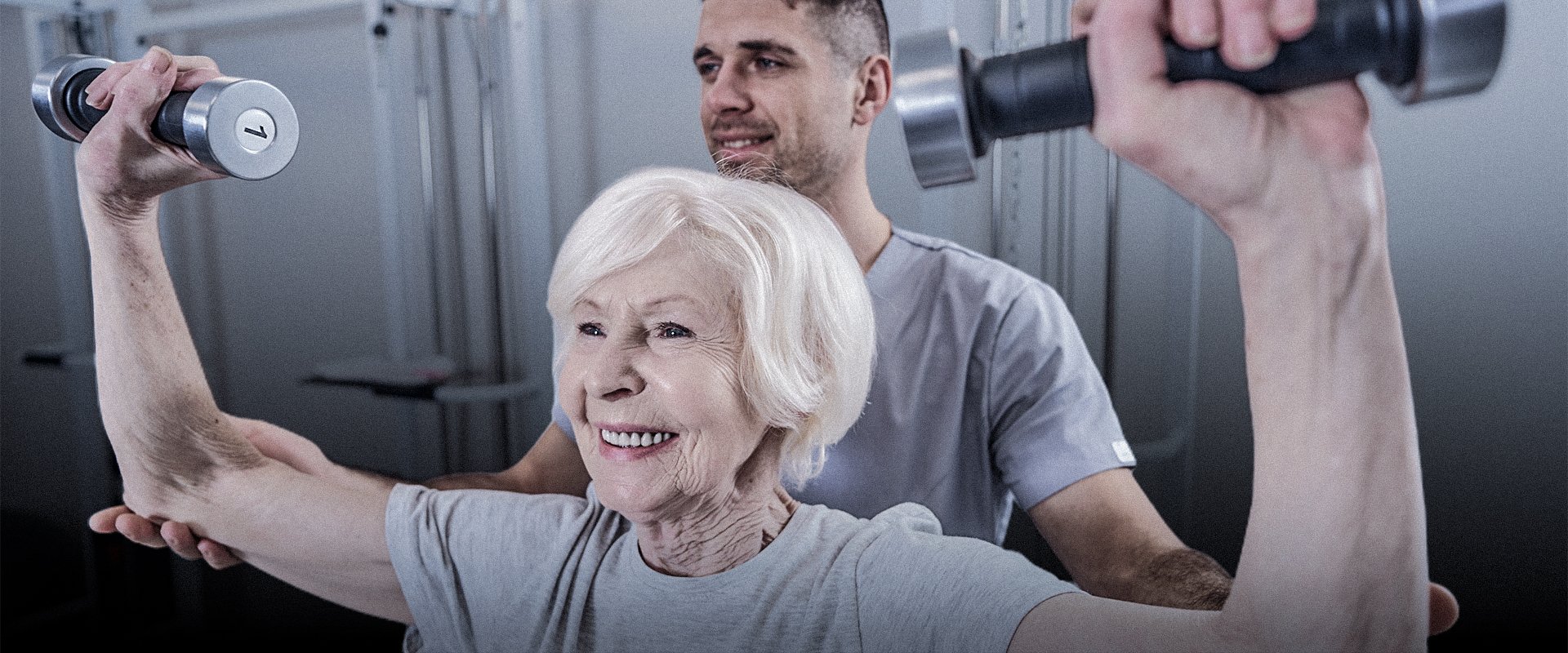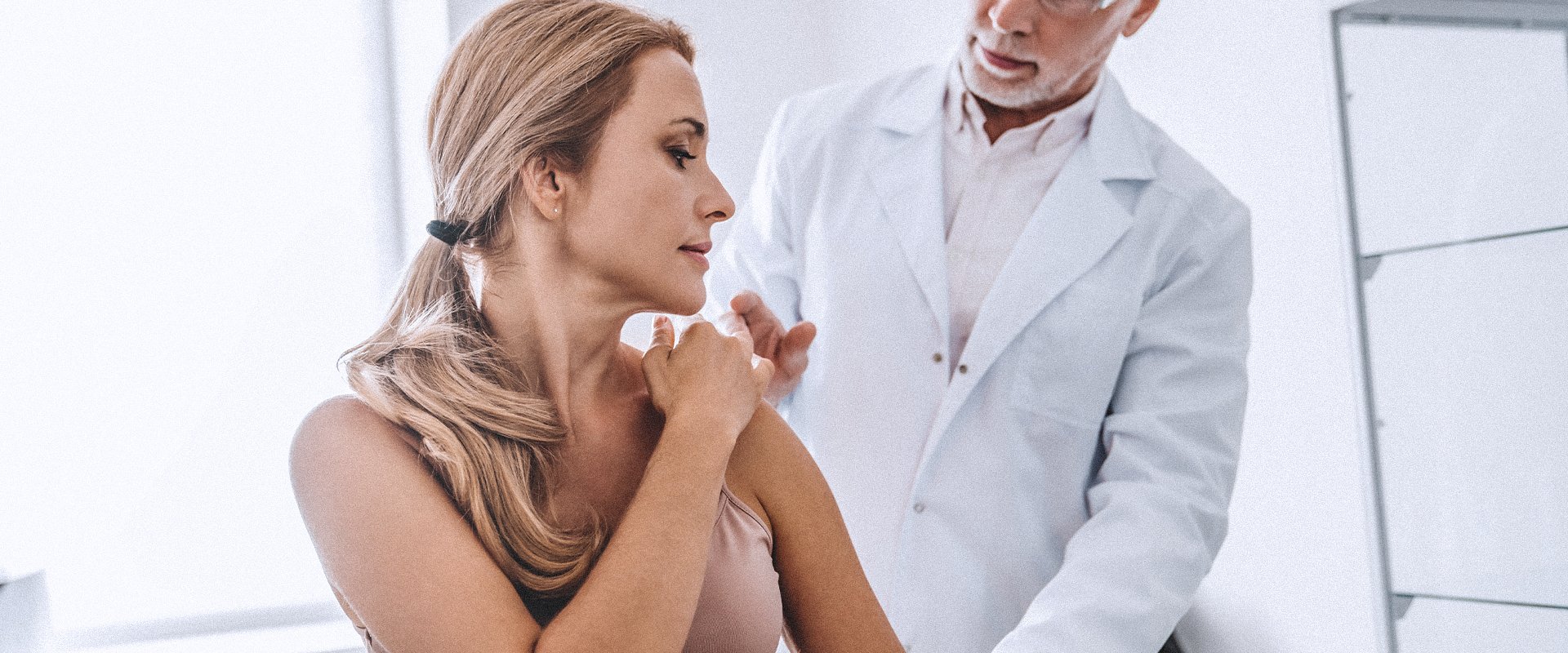
Rehab for Rotator Cuff Surgery
AT EVOLVE
Rehab for Rotator Cuff Surgery
HOW CAN PHYSICAL THERAPY HELP ME RECOVER FROM ROTATOR CUFF SURGERY?
Physical therapists play an important role in recovery following shoulder surgery and rotator cuff surgeries are no exception. Following surgery, the repaired rotator cuff tendons need careful rehabilitation to return to their prior state of function, as do other components of joint function that may have developed impairments leading up to and following surgery. Physical therapy helps promote healing of the surgical area and return to improved function through the use of manual therapy techniques, therapeutic exercises, neuromuscular re-education and more.
WHAT DOES PHYSICAL THERAPY FOLLOWING ROTATOR CUFF SURGERY LOOK LIKE?
My team of physical therapists and I will help you recover from rotator cuff repair surgery. A period of 4-6 weeks of shoulder immobilization is common after rotator cuff repair surgery, which means early interventions from a physical therapist will focus on pain management, passive range of motion that does not elicit any muscle contractions and interventions aimed at adjacent areas like the neck, elbow and wrist which may also experience muscle atrophy or stiffness when the shoulder is immobilized. When your surgeon determines it is safe to begin moving the shoulder, PT will work on reducing swelling around the surgical site, teach you how to protect the area and initiate return of muscle function and range of motion around the joint.
As recovery progresses you will continue through a series of exercises to increase range of motion, improve strength and neuromuscular control, regain normal movement and then progress to sport-specific or work-specific activities, for example. Usually therapy consists of 2-3 visits per week as well as a series of exercises or other activities you will perform at home between visits. The frequency of visits often decreases near the end of your rehabilitation program.
HOW LONG WILL I NEED PHYSICAL THERAPY?
Recovery time usually takes 4-6 months. The duration of your physical therapy plan of care will vary depending on a few variables including the surgical approach, how well you are healing and what level of impairments existed prior to and following the surgery. A patient who was unable to use their arm much prior to their surgery may need a longer course of care than a patient who was able to maintain a relatively normal level of activity. While full return of function may take some time, you may begin to see some results right away. You should experience improvements in many symptoms such as pain and inflammation within a few weeks. Your surgeon will typically provide a timeline for initiating certain exercises or activities and this will also impact the length of your physical therapy plan of care.
Progression in strength, flexibility and overall mobility that allows you to use the arm comfortably and in a more normal manner takes longer. Achieving long lasting results may take some time, but dedication to your program will help you achieve these results. Your PT will be able to give you a more specific timeline for recovery after your surgery and as you move through the rehabilitation process.
ROTATOR CUFF SURGERY
Rotator cuff surgery is intended to reattach or repair a torn rotator cuff tendon in order to address symptoms of pain and weakness. The muscles of the rotator cuff originate either on top of the shoulder or at the shoulder blade and attach to the humerus (upper arm bone). The muscles of the rotator cuff and their function are as follows:
Supraspinatus: Located over the top of the shoulder, this muscle aids in lifting the arm up at the side, a movement called “abduction”
Infraspinatus: Located posteriorly along the outside of the shoulder blade, this muscle aids in rotating the arm outward, a movement called “external rotation”
Teres Minor: Located posteriorly along the outside of the shoulder blade, this muscle aids in rotating the arm outward, a movement called “external rotation”
Subscapularis: Located posteriorly along the underside of the shoulder blade, this muscle aids in rotating the arm inward, a movement called “internal rotation”
The muscles or tendons of the rotator cuff can tear due to an injury or in response to chronic wear-and-tear from repetitive movements such as reaching up to place boxes on high shelves at work. Nonsurgical management such as physical therapy is usually the first line of treatment for a torn rotator cuff. In cases where significant pain persists or loss of shoulder function prevents a person from being able to participate in athletics or work duties, surgery may be recommended. There are three surgical techniques most commonly used to repair a torn rotator cuff tendon:
Arthroscopic procedure: small cameras and instruments are inserted through small incisions called portals, in order to repair the torn tendon. This is a much less invasive procedure than an open technique
Open procedure: a larger incision is made at the shoulder and the deltoid muscle is often split in order for the surgeon to access and repair the torn tendon. Most commonly used for large tears or if a tendon transfer is needed
Mini Open technique: This technique mixes the previous two approaches together in which an arthroscopic technique is used to visualize and address small repairs and an incision which is smaller than the traditional open technique is used to repair the tendon itself.
End Injury Progression
Rehab physical therapy for rotator cuff surgery has proven to prevent injury, slow and even stop pain issues, improve performance, and reverse injury progression in many cases.
Relieve Pain
The movements used in this technique can target your entire body helping you to manage discomfort and pain during the course of your physical therapy treatments.
Improve Range of Motion
Posture awareness is an important area to focus on due to the fact that certain positions may cause you further discomfort and pain.
Restore Mobility
You can regain mobility and flexibility by taking part in the stretches and exercises as prescribed by your physical therapist.
How Long Will Rehab Physical Therapy for Rotator Cuff Treatments Last?
If you decide to work with a physical therapist to help with rotator cuff rehab issues, your entire treatment plan could consist of around 8-20+ different physical therapy sessions that will each last 60-90 minutes. Once you complete your customized physical therapy treatment plan, you will be able to continue to do the prescribed stretches and exercises utilized during your PT sessions yet in the comfort of your own home.
WHAT CAN I EXPECT FROM PHYSICAL THERAPY AFTER SURGERY?
As mentioned above, rehabilitation following rotator cuff surgery often lasts 4-6 months and the timeline is dictated in part by the post surgical protocol prescribed by your surgeon. In the weeks after your surgery when movement in the shoulder is restricted, your physical therapist may use modalities, manual therapy techniques or passive range of motion to address pain and inflammation and to start restoring passive motion. When your surgeon clears you to begin actively moving, your PT will prescribe some of the interventions below to begin restoring tissue and muscle function and length. As you progress through your recovery and the surgical site is allowed to undergo more stress, your physical therapist will begin to progress these interventions in order to help you achieve your maximal level of function:
Muscle Strength and Endurance: Restoring strength and endurance to the muscles around the shoulder (as well as the shoulder blades, elbow and wrist), is an important part of post-surgical rehabilitation. It will help improve mobility and assist you in returning to your prior level of function. Strength losses can be attributed to a decreased level of exercise or activity pre-surgery as well as a result of immobilization, pain, inflammation and modified activity post-surgery.
Active and Active-assisted Range of Motion: regaining range of motion is important following surgery as well as a period of immobilization. Your PT will teach you how to safely begin performing range of motion exercises on the shoulder to help restore movement.
Stretching: Stretching is often needed after a surgery to restore normal joint motion and muscle length. Restoring full or functional range of motion is very important and your PT will guide you on how to do this safely without compromising the surgical repair.
Neuromuscular Re-education: This type of treatment is used to improve the motor control and coordination of muscles around the shoulder joint so the limb functions well during both daily tasks and higher impact activities like light athletics or job duties.
Sport and job-specific tasks: For athletes returning to athletics or workers returning to a job, sport- and job-specific exercises will be incorporated later on in your rehabilitation to prepare the surgical site for the demands of returning to these activities.
While recovering from a surgery can seem like a long process, the therapists at Evolve are here to help you recover fully from rotator cuff surgery. Call Evolve today to schedule your first appointment with one of our team members.
Mill Basin (located in Harbor Fitness)
6161 Strickland Ave
Brooklyn, NY 11234
Monday: 7am-8pm
Tuesday: 7am-8pm
Wednesday: 8am-5pm
Thursday: 7am-8pm
Friday: 8am-1pm
Park Slope (located in Harbor Fitness)
550 5th Ave.
Brooklyn, NY 11215
Monday: 9am-8pm
Tuesday: 8am-6pm
Wednesday: 9am-8pm
Thursday: 8am-6pm
Friday: 8am-3pm
Gravesend
372 Avenue U
Brooklyn, NY 11223
Monday-Thursday: 8am-8pm
Friday: 8am-3pm
Ready to take the next step to a healthier you?
Contact Us Today!
REHAB PHYSICAL THERAPY FOR ROTATOR CUFF SURGERY!
Need Rehab for Rotator Cuff Surgery?
Let our caring and compassionate physical therapists help you with relieving pain while getting you back on your feet comfortably.
Call now to schedule your first PT consultation free of charge.
Call: 1-718-524-3070







